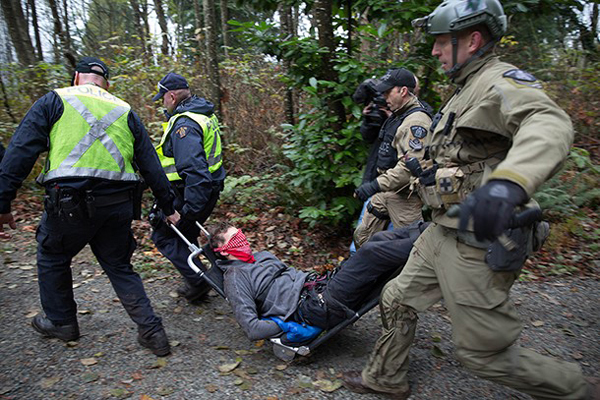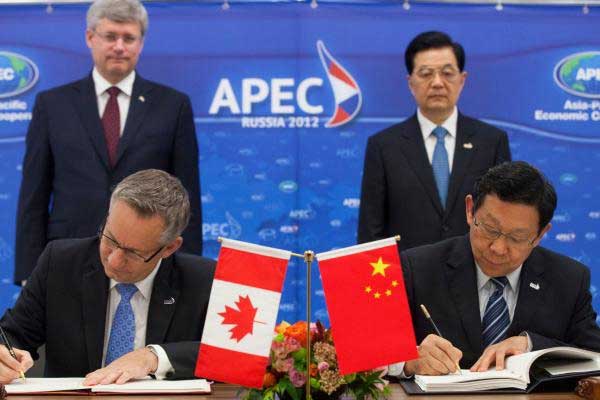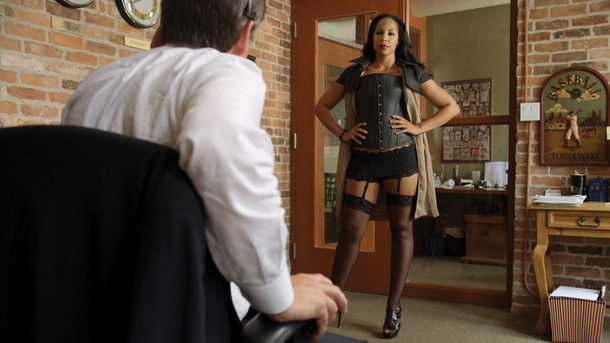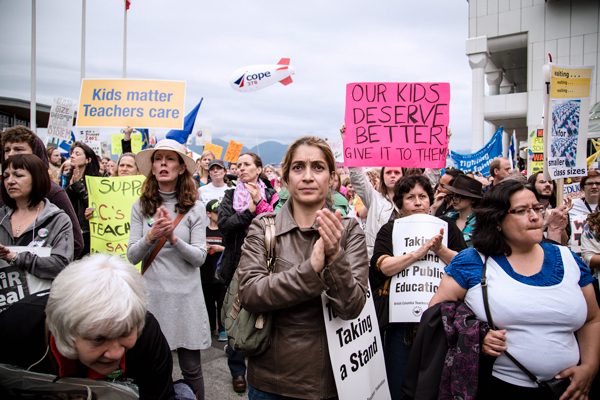For a year so jam-packed with wildly varied news, there is zero doubt which story was biggest for Tyee readers in British Columbia: the tortuous teachers' labour dispute. Someone had to cut through the spin by providing the history, the context, the stakes and what was driving each side's strategic decision making. The Tyee was glad to provide that service day in and day out.
We were rewarded with our biggest ever two-month surge of sustained traffic during the July through September height of the dispute.
What else most grabbed our readers' attention? The Tyee's scoop that the Harper government was in a weirdly chaotic rush to dismantle fishery and oceans science libraries. That and the politics of energy; Olympian meanness; reality checking Jian Ghomeshi; Stephen Harper's evangelical church and sex after having children.
If you are interested in what our beat reporters considered their own favourite articles of the year, have a look at this published yesterday.
Meantime, we've prepared a list of the top 20 Tyee stories most read by British Columbians, and another of the 20 most read by all Tyee visitors. Forge on with the full assurance that you are, incredibly, about to enter a Rob Ford-free zone.
TOP TYEE STORIES READ BY BRITISH COLUMBIANS
As the teacher's strike dragged on, amidst a media blackout by both sides, everyone wanted to know: what's the hold-up? Tyee contributing editor Crawford Kilian's sources revealed the government was insisting on a clause, later identified as E80, that would make teachers give up what they'd gained in two Supreme Court decisions. Kilian noted another government stipulation, E81, made public in June to little media stir, "that when the Court of Appeal decision is handed down, any existing contract may be terminated by either party and new bargaining will resume." Kilian's piece drew attention like a crack of light piercing an airless dark room, pulling the most B.C. readers for any Tyee article. The government went on to drop both E80 and E81.
Written in March well before the teachers hit picket lines, veteran education analyst Crawford Kilian traced the relentless push by the BC Liberals to strengthen private schools. The story had a second life during the strike as readers sought context for the government's priorities.
With the official first day of school just a week away, all sides had completed another fruitless session and Education Minister Peter Fassbender was first to spin why. Crawford Kilian, having literally written the book on B.C.'s School Wars, was well suited to decipher the government's lines. A sample:
"Fassbender: 'I'm not asking the BCTF to do anything prejudicial to their court case, but setting this issue aside as the appeals process takes place gives mediation a chance to succeed.'
"Translation: The Court of Appeal will nail us again, but sometime next year. And a year is a long time in politics... "
Watchers of the teachers dispute craved a user's guide to the complex conflict. Katie Hyslop, who reports on education for The Tyee and Tyee Solutions Society, painstakingly yet concisely detailed 13 years of negotiations, contract stripping, court battles and job actions leading into this year's mess. Hyslop first posted her piece on May 21 and then updated it a few times as the saga proceeded.
Early in August, when parents were looking for signs the government was working hard to close the gap with teachers, Premier Clark sent a startlingly different signal. She would give them public money to spend on private tutoring should there be no resolution by September. Again drawing from his education expertise, Crawford Kilian examined the ideological roots of Clark's ploy, and why its corollary, school vouchers, hasn't worked where tried.
More realpolitik clarity, this by long-time labour consultant and Tyee columnist Bill Tieleman. Why had the B.C. government swiftly rejected the teachers' acceptance of binding arbitration? Tieleman knocked away the government's claim that teachers' high wage and benefits demands made arbitration too risky. Actually, an arbitrator was highly likely to align teachers with other recent public sector deals. So what did Clark and team really fear? A binding deal that kept the teachers' class size and special needs wins awarded by the Supreme Court.
Was it anyone's business which B.C. MLAs (in addition to Premier Clark) send their kids to private schools? We thought so, given the antagonism the Liberal government had long shown public school teachers, its refusal to obey two Supreme Court mandates to spend more on public education, and now, a fight threatening to disrupt the lives of parents with kids in public schools. Call us rude, but we asked every MLA. Given the number of page views, our readers sure did make it their business.
During the teachers dispute The Tyee gave voice to many involved. This piece by educator and activist Tom Kertes laid out why teachers believed they were fighting for principles far more important than a bump in pay.
In January, Crawford Kilian contemplated Clark's vow to appeal her government's second Supreme Court defeat over stripping teachers' rights to bargain class size and special needs accommodations. Like the judge, he saw bad faith: "While [the BC Liberals] unconstitutionally deprived the current generation of students of the education they should have had, they're far past being shamed into doing the right thing."

On the day B.C.'s public schools should have opened, Crawford Kilian talked with BCTF president Jim Iker and analyzed why each side was still waiting for the other to blink.
With the school year slated to start in just a few days, teachers faced pressure inside and outside their ranks to go back to work and keep negotiating while giving classes. Don't do it, Bill Tieleman warned. The teachers did stay on the picket line until the deal was cut.
When Prime Minister Harper first sought ratification of a sweeping trade deal with China, The Tyee led the way in surfacing serious problems with the pact. Facing a backlash from left and right, Harper put aside his effort to ram the deal through Parliament. That was two years ago. So when Harper suddenly ratified FIPA with no warning in September, we expected a similar uproar. But The Tyee was pretty lonely among media in reviving the critical analysis. You can't say no one was interested, given the huge traffic for this piece by Scott Harris, as well as other FIPA-related Tyee stories.
Educator and organizer Tom Kertes deconstructed the education minister's pose as the stern father who tells the family this is more than we can afford -- then Kertes explained why such arguments did not add up.
Acclaimed author John Vaillant on climbing Burnaby Mountain to defy the vast power and reach that makes Kinder Morgan a 'gorilla' among energy companies. His cool, clear, fact-based reasoning exploded on social media.
West Vancouver school board trustee Reema Faris argued the government faced a fiscal "calamity" should it lose its Supreme Court appeal over teacher bargaining rights. Therefore it made good business sense to settle the strike on any terms that rendered the appeal moot.
Bill Tieleman did the math behind the BC Liberal government's slowness to bargain: "Make public education less attractive, hurt your union opponent, promote and fund private schools like your son's and save money the whole time -- that's a perfect score for the premier."
Here's what we wrote about this one last year when it popped up on The Tyee's most read list: "This article by Andrew Nikiforuk racked up huge numbers when it was published in March of 2012, and as they say in web-speak, it has a very long tail. People are still apparently fascinated to read about the fundamentalist teachings of Prime Minister Harper's Alliance Church and how they may be reflected in policy shifts pressed by the Harper government." Apparently, interest has not waned!
Bob Mackin's scoop: "The advertising agency behind the BC Liberal government's $335,000 online campaign against the striking B.C. Teachers' Federation is the same company that designed the party's logo, and its founder boasts a long association with Premier Christy Clark."
The Tyee republished this blog post by Canadian BDSM educator Andrea Zanin just after Jian Ghomeshi had issued his Facebook post claiming his firing by CBC made him a victim of discrimination against a whole community's sexual preferences. In speaking for that community, Zanin clarified the importance of consent and BDSM rules and understandings that prevent unwanted abuse. Thus began the crumbling of Ghomeshi's public relations gambit.
Can't muzzle these government experts! The Professional Employees Association, which represents government-licensed science officers such as foresters, issued a scathing report on cutbacks in the public service placing B.C.'s forests and other natural assets at risk. Danish journalism student Kristian Secher spent his practicum at The Tyee breaking lots of news, including this big attention getter.
Other greatest hits include Mount Polley, Sanctuary City and the health ministry firings. While the above were individual Tyee stories most read by British Columbians, they don't include some of our most important and closely followed reporting. To give just three examples:
Our investigative coverage of the Mount Polley mining disaster (examples here, here, here and here).
David P. Ball's groundbreaking series on whether Vancouver might pass laws protecting undocumented immigrants.
And the cutting edge reporting by Tyee B.C Legislature reporter Andrew MacLeod, breaking multiple stories about the fouled up firings of health ministry employees researching pharmaceuticals. Andrew's overview of his many pieces is here.
TOP 20 READ STORIES BY ALL WHO CAME TO THE TYEE
We've shared what only British Columbians read most on The Tyee in 2014. But with reader financial support The Tyee launched its National section this year, hired a Parliamentary reporter, and broadened our reporting relevant to all Canadians. In fact, more than half our visitors now arrive from outside B.C.'s borders. Here then, are the top read Tyee stories by all visitors including those from B.C. and not.
The most read Tyee story of any last year was published a week before 2014 began. It was Andrew Nikiforuk's expose of the federal government's dismantling of science libraries, which followed on his related blockbuster earlier the same month. Scientists revealed "the closure of some of the world's finest fishery, ocean and environmental libraries by the Harper government has been so chaotic that irreplaceable collections of intellectual capital built by Canadian taxpayers for future generations has been lost forever." Nikiforuk's reporting sparked demands for answers by the Opposition in the House. But the government has yet to show its supposed cost-saving accounting, or a plan in progress to digitize the collections as promised.
The second most read Tyee story also was published before last year. This 2009 investigation by Katie Hyslop drew parallels between Vancouver and four previous Olympics hosts -- Seoul, Atlanta, Sydney and Athens -- that passed laws before their Games to criminalize and banish homeless people from city streets. Sochi's 2014 Winter Olympics sparked renewed, global interest in such measures.
(See #1 in the BC Readers list above for a description.)
(See #4 in the BC Readers list above for a description.)
(See #17 in the BC Readers list above for a description.)

(See #12 in the BC Readers list above for a description.)
(See #2 in the BC Readers list above for a description.)
It's such a staggering contrast you have to wonder why the rest of Canada's media isn't hammering home Mitchell Anderson's deeply researched point. How has Norway managed to save a trillion dollars securing its every citizen's livelihood while Alberta, with similar resources and population, is in debt? It starts with the pacts Norway cut with oil giants, and then how it invested the proceeds. A big lesson for election year Canada? Ya!
Another timely myth buster by Tyee contributing editor Mitchell Anderson, this published as Prime Minister Harper keyed off the Ottawa shooting to call for more policing and spying to fortify Canada against terrorist attacks. Except the solo attacker, as Anderson noted, was so addled he had tried to turn himself into police and psychologists, but "his case was swallowed by the yawning cracks in our broken mental health system." Why not spend the money on shoring up mental health support instead?
(See #3 in the B.C. Readers list above for a description.)
(See #5 in the BC Readers list above for a description.)
(See #19 in the BC Readers list above for a description.)
While petro-pleasing media chose to scoff at an aging rock star's stand against the oil sands, Tyee columnist Ian Gill actually attended Young's Winnipeg concert and soaked up the power of his appeal. "Just like they did in residential schools, our governments have tried to beat us or ban us from speaking, in whatever actual tongue, of a Canada that is compassionate, considerate and has a confidence rooted in a shared hope for a better world... " Gill's reflections on Young's heart of gold zoomed up the charts.

14. 'Sex After Kids': Is postpartum coitus ever the same? Finally, a film that probes.
Note to shameless headline writer: Well done! And, hmmm, apparently this issue interests a large swath of The Tyee's demographic.
Had anyone ever toted up all the financial favours Canada gives to the fossil fuel industry, from tax breaks to taxpayer supported infrastructure to publicly absorbed 'externality' costs? The stodgy accountants at the International Monetary Fund did just that -- and arrived at a whopping bill born by the Canadian citizenry. Relatively bigger, in fact, than by citizens of just about any other nation, reported Mitchell Anderson.
(See #6 in the BC Readers list above for a description.)
17. How Men Choose Women: From 'The Private Lives of Men.'
Published nearly nine years ago, our headline for J.M. Kearns' essay, "How Men Choose Women," is clearly an ongoing, Google-friendly phrase -- not to mention the stuff of great literature and bad pop lyrics.
(See #7 in the BC Readers list above for a description.)
(See #14 in the BC Readers list above for a description.)
This piece of techno-apocalyptic anthropology by Geoff Dembicki rounds out our list. A millennial, Dembicki had a personal stake in reporting on various people carving out potential scenarios for a new economy in a climate changed world. Dembicki profiled the Seasteaders, who dream of forming a self-sufficient society on an offshore platform, as part of his fascinating series "Are We Screwed?"
It is such a pleasure to be involved in bringing you the wonderful, important work of my talented colleagues at The Tyee. Thanks for all your support. See you in 2015!
Please note our comment threads will be closed Dec. 22 to Jan. 5 to give our moderators a well-deserved break. Happy holidays, readers. ![]()
Read more: Media















